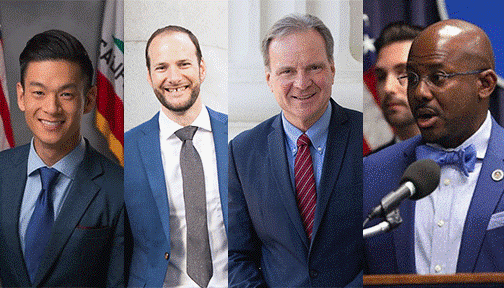Cortese, Gipson, Low, Boudin, and Advocates Discuss Groundbreaking Plan to Provide Universal Basic Income to Foster Youth in California
Staff writers at East County Today, Antioch, CA
Senator Dave Cortese (D-San Jose), Assemblymember Mike Gipson (AD-64), Assemblymember Evan Low (AD-28), San Francisco District Attorney Chesa Boudin, and advocates discussed a first-of-its-kind plan moving forward in the California Legislature that would provide universal basic income (UBI) to all California youth aging out of the foster care system and transitioning into adulthood.

https://www.youtube.com/watch?v=q_fAIMAx7hE&t=2028s
SB 739, the Universal Basic Income for Transition Age Foster Youth Act, has cleared crucial hurdles, passing through the Senate Human Services Committee as well as the Senate Appropriations Committee. It will be voted on by the entire Senate floor later today.
SB 739 would mark an historic statewide investment towards UBI.
SB 739 would provide unconditional and direct cash assistance of $1,000 a month to approximately 2,500 youth aging out of the Extended Foster Care Program in California. The pilot program, based on the successful model championed by Senator Cortese in Santa Clara County, would be administered by the Department of Social Services over the course of three years.
The Senator shared today that the Legislature’s version of the 2021-22 Budget released this week included his budget request of $60 million to fund the first two years of this proposal. The approximate cost of implementing this pilot program is $30 million per year, for a total of $90 million (the third year of this program being contingent on an appropriation in the next State budget cycle).
“Direct cash assistance empowers people in a way that our traditional overly prescribed social safety net programs do not,” said Senator Cortese. “It tells people that they are capable and trusted to make the financial decisions that are most important to their individual well-being and success.”
“Guaranteed income is by no means a new concept” said Cortese pointing to the outcomes of the basic income pilot in the City of Stockton called the Stockton Economic Empowerment Demonstration (SEED) and noting that this program supported 125 residents attain stable employment, meet their basic needs, and improve their physical and mental health. Results from the SEED program displayed that participants used their cash assistance payments to pay for basic needs such as housing and food and that they and that they obtained full-time employment at more than twice the rate of non-participants.
“Thousands of young people age out of the foster care system each year, and many go on to face economic hardship while lacking key support systems. Universal Basic Income is one of the most exciting tools we have to give them a fighting chance to pursue their dreams with dignity,” said Assembly member Evan Low (D-Silicon Valley). “I’m proud to stand alongside Senator Dave Cortese in support of SB 739 to make sure we give foster youth the assistance they need as they start the next chapter of their lives.”
“The level of instability that these youth endure are absolutely heartbreaking,” said Assembly member Mike Gipson. “SB 739 will help alleviate some of that burden as they transition out of the foster care system.”
A May 2020 poll of young people in foster care found that nearly 65% who were transition-age have lost their jobs; nearly 1 in 5 have run out of food; almost a quarter (23%) are at risk of losing their housing; and just 37% of the transition-aged youth have family members (legal or chosen) to rely on during the crisis, with 1 in 5 reporting that they are entirely on their own.
Foster youth in the Extended Foster Care Program receive a monthly Supervised Independent Living Placement payment, or SILP payment, of $1,000 per month. Custodial parents receive an additional Infant Supplement Payment of $900 per month. Upon aging out of care at 21, these two crucial benefits are abruptly cut off.
“Transitional age youth without familial support far too often end up victimized or arrested and incarcerated for committing crimes to support themselves,” said District Attorney Chesa Boudin. “I thank Senator Cortese for introducing Senate Bill 739 to pilot a program that would close that gap for those who age out of foster care this year. This pilot program will show that those youth who get support will build a foundation for future health and success. These and other basic income programs will prove to be an excellent, and ultimately more cost-effective, use of government resources. I am proud to cosponsor this important legislation to make our communities safer.”
“For those youth that age out of the system, the very safety net we’re supposed to be creating through the child welfare system swiftly disappear and once again foster youth are left without the support that many of their peers are increasingly finding necessary well into their early 20’s,” said Shimica Gaskins, Executive Director at the Children’s Defense Fund California.
“Compounded by the disadvantages foster youth have already had to endure – growing numbers of foster transition age youth are falling into homelessness – one in four.”
Kenneth Chancey, Policy Manager at the National Foster Youth Institute, on behalf of NFYI and the End Child Poverty CA Coalition said, “I exited the foster care system straight into homelessness, where I resided on Skid Row at the Union Rescue Mission. But my story is not unique. Foster youth are aging into poverty and homelessness on a routine basis, often occupying the tents that line our streets. The solution is simple – provide these young adults with a stable financial foundation that is not conditioned on their medical, academic or career accomplishments.”
“More than financial support, because UBI is unconditional and dispersed with no strings attached, it empowers young people to decide for themselves how to spend the money to meet their specific needs,” said Gisèle Huff, president of the Gerald Huff Fund for Humanity, who partnered with Senator Cortese on the pilot program launched in Santa Clara County that inspired SB 739.
Sponsors of SB 739 include San Francisco District Attorney Chesa Boudin, GRACE/End Child Poverty California Coalition, and the Children’s Defense Fund – California. For a full list of supporters and for more information on this bill, click this link.
For a recording of the full news conference, visit Senator Cortese’s website at this link: https://sd15.senate.ca.gov.




















